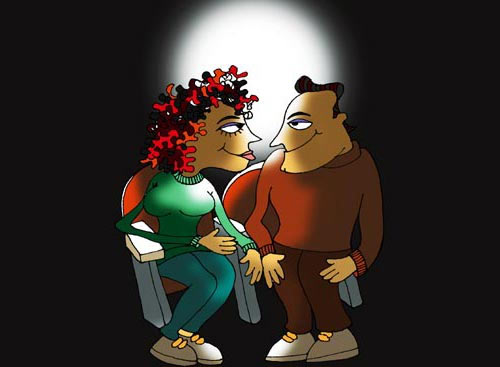
A roundup of recently published sex and relationship news
Increasing numbers of people are having sex less frequently due to money worries and distractions of social media, it has been revealed.
According to a research conducted on 15,000 Britons, people aged 16-44 were having sex lesser than five times a month, the BBC reported.
The authors of the study said that modern life may be having an impact on libidos as people are worried about their jobs, about money which kills their mood for sex.
Dr Cath Mercer, from University College London said that modern technologies are behind the trend too as more people are taking their tablets and smart-phones into the bedroom to use Twitter, Facebook and answering emails.
The survey carried out by NatCen Social Research and analysed by researchers from University College London and the London School of Hygiene and Tropical Medicine suggested that couples aged 16 to 44 may be using online porn as a substitute for sex.

A revelation of an affair is a devastating blow to any relationship, but when the cheater blames their partner for creating a situation that “made them” vulnerable to the affair, that usually puts the shock and hurt over the top, an expert has revealed.
Sheri Meyers, author of Chatting or Cheating, has suggested that when cheating happens, both partners must take a serious look at their own responsibility and contribution to the downfall of their relationship, the Huffington Post reported.
Meyers has listed out few reasons why most cheaters say they strayed.
Researchers have shown that couples who lead separate social lives are much more likely to cheat than couples who spend more time enjoying common friends and interests.
The expert suggested that frequent criticism and complaining is a big indication that your relationship needs work now.
When partners behave like roommates rather than sexual partners, they may begin to look outside of the relationship for physical or emotional fulfillment.
Meyers said that if needs of partners are going unmet, and they feel all they do is sacrifice for others, they may end up having an affair to satisfy some unmet desires because they feel “they deserve it.”

Sex can cause pretty serious injuries, as a new survey has revealed that one in 20 Brits have injured themselves during the act.
English actress Leslie Ash had once confessed that she broke a rib while having sex with her footballer husband Lee Chapman, the Daily Star reported.
In one incident, firefighters were called to a Manchester hospital to cut a sex aid off 69-year-old man’s penis after he battled for 36 hours to remove it.
The Saturdays singer Rochelle Humes had also admitted that she had to go to the emergency room after a romp with her husband.
The survey done by pain-relief gel Polar Frost has shown that Brits are the most adventurous and sometimes reckless lovers.

A new study has revealed that although newlyweds may not be completely aware of it, they may know whether their march down the aisle will result in wedded bliss or an unhappy marriage.
Associate Professor of Psychology James K McNulty from Florida State University and his colleagues studied 135 heterosexual couples who had been married for less than six months and then followed up with them every six months over a four-year period.
They found that the feelings the study participants verbalised about their marriages were unrelated to changes in their marital happiness over time. Instead, it was the gut-level negative evaluations of their partners that they unknowingly revealed during a baseline experiment that predicted future happiness.
“Although they may be largely unwilling or unable to verbalise them, people’s automatic evaluations of their partners predict one of the most important outcomes of their lives -- the trajectory of their marital satisfaction,” the researchers said.
The study outlined two important findings. First, people’s conscious attitudes, or how they said they felt, did not always reflect their gut-level or automatic feelings about their marriage.
Second, it was the gut-level feelings, not their conscious ones that actually predicted how happy they remained over time.
McNulty said that everyone wants to be in a good marriage and in the beginning many people are able to convince themselves of that at a conscious level. But these automatic, gut-level responses are less influenced by what people want to think. You can’t make yourself have a positive response through a lot of wishful thinking.
McNulty said the study suggested that people may want to attend a little bit to their gut. If they can sense that their gut is telling them that there is a problem, then they might benefit from exploring that, maybe even with a professional marriage counsellor.
The study is published in the journal Science.

A team of researchers, studying how human emotions such as regret can play an important role in survival and reproduction, have suggested that men are more likely to regret not taking action on a potential liaison, and women are more remorseful for engaging in one-time liaisons.
“Prior sex researchers have focused primarily on the emotion of sexual attraction in sexual decisions. These studies point to the importance of a neglected mating emotion -- sexual regret -- which feels experientially negative but in fact can be highly functional in guiding adaptive sexual decisions,” David Buss from University of Texas at Austin, said.
Martie Haselton, a UCLA social psychology professor, said that evolutionary pressures probably explain the gender difference in sexual regret.
Haselton said that for men throughout evolutionary history, every missed opportunity to have sex with a new partner is potentially a missed reproduce opportunity -- a costly loss from an evolutionary perspective.
But for women, reproduction required much more investment in each offspring, including nine months of pregnancy and potentially two additional years of breastfeeding. The consequences of casual sex were so much higher for women than for men, and this is likely to have shaped emotional reactions to sexual liaisons even today, Haselton said.
The researchers found that the top three most common regrets for women are: losing virginity to the wrong partner (24 per cent), cheating on a present or past partner (23 per cent) and moving too fast sexually (20 per cent).
For men, the top three regrets are: being too shy to make a move on a prospective sexual partner (27 per cent), not being more sexually adventurous when young (23 per cent) and not being more sexually adventurous during their single days (19 per cent).
More women (17 per cent) than men (10 per cent) included "having sex with a physically unattractive partner" as a top regret.
The study is published in Archives of Sexual Behavior.

A new survey has found that women nowadays have become more sexually liberated as compared to men, and are engaging in sexual activities with several partners at a younger age.
According to the National Survey of Sexual Attitudes and Lifestyles, women are also leading men in the case of same-sex relationships, with four times as many women now report gay experiences compared to 20 years ago.
However, the survey also found that women who have had one or two sexual partners are up to three times more likely than men, to be at the receiving end of sexually transmitted diseases.
One of the survey’s lead authors, Professor Kaye Wellings of the London School of Hygiene and Tropical Medicine, said that the poll clearly shows that the gap previously seen between men and for women has been closing in the last decades.

In an attempt to find the magic formula for keeping a marriage healthy, researchers conducted a study that seems to signal greater marriage satisfaction.
Robert Levenson, director of the Institute of Personality and Social Research at the University of California, Berkeley, who has been studying 156 couples since 1989, has suggested that women may hold the key to resolving arguments, Fox News reported.
It was found that relationships in which the wives cooled down quickly after an argument were the happiest in both the short and long term.
The researcher said that it is important to be more versatile, as what’s good for one partner might not help the other. One needs to have different approaches for interacting with each other and tailor them to the situation.
Levenson suggested that saying “we” instead of “me” can save your fading marriage.
It was found that the ones who said “we” the most ranked significantly higher in marital satisfaction than those couples who repeatedly used “I” and “me” while arguing.

The things that women look for in an ideal partner have been revealed.
Research has revealed that modern women are looking for a “multidimensional man”, who knows and cares about what’s going on in the world, News.com.au reported.
According to the survey conducted by Lynx, 96 per cent of women like a man with good general knowledge and is not a pushover.
Dating coach Katia Loisel-Furey said that women like men who can be themselves and don’t take themselves too seriously.
Research has confirmed that women find guys with a sensitive side, good conversation skills, dresses well and with good reasoning ability, more attractive.
Also, guys who know what they want in life and guys who step in and offer to help even if women don’t really need it are preferred over those who stay away from helping.
Research has shown that doing your bit around the house makes you seem more attractive as 80 per cent of women have admitted that they like men who are good in the kitchen.

Are you and your spouse one of those couples who like to spend every waking hour together?
If so, then it is probably time to rethink the constant closeness. According to YourTango.com, couples can maintain a happy marriage if they leave their office stress behind them when they enter the house, as it is possible that your spouse may not want to hear about people he or she may not know, on a daily basis, the Huffington Post reported.
It is also important to remember that couples don’t have to do everything together if they don’t like the hobbies their spouse likes. Lastly, apart from doing things that you enjoy as a couple, take time to do something for yourself too.

Erection drugs do not actually improve a man’s relationship, a new study has revealed.
Information from 40 clinical trials of men having erectile dysfunction was reviewed to check if their quality of life or relationships changed after receiving medication, known as PDE5 inhibitors.
The men being tested revealed that their life and relationships were relatively good but there seemed to be poor sexual relationship and satisfaction, and they all showed some symptoms of depression and low self-esteem.
After treatment, the participants saw a significant change in terms of better sexual satisfaction and higher confidence, Live Science reported.
However, none claimed that there was any improvement in their overall life or relationship satisfaction, according to the study.
Dr Andrew Kramer, urologist at the University of Maryland Medical Center said that the study raised attention that people with erectile dysfunction should probably see someone for relationship psychosocial issues and physical issues.
Erectile dysfunction (ED) is a condition in which a man is often unable to achieve or keep an erection for or during sexual intercourse.
According to the researchers, there is evidence which implies that the negative effects of ED exist beyond a man’s inability to have sex, and instead also impact their emotional and psychological well-being.
The researchers wrote in their study that treatments that target both physical and psychosocial aspects of ED are likely to be the most effective.
The study is published in the Journal of Sexual Medicine.